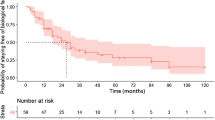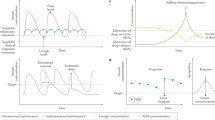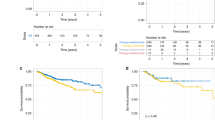Abstract
Therapy for Crohn's disease has long been based on a step-up approach, with monoclonal antibodies against TNF as a final option before surgery. Despite the introduction of these monoclonal antibodies, no major changes have occurred in the natural history of Crohn's disease, with half of all patients still requiring intestinal resection at 10 years. Labelling for anti-TNF agents does not take into account prognostic factors. In this Review, we propose that treatment of Crohn's disease be based on the following three disease stages: mild, moderate and severe. In patients with Crohn's disease who have complicated disease or bowel damage, and with poor prognostic factors and/or severe disease, anti-TNF treatment should be considered as first-line therapy. For patients living in areas of high risk of developing tuberculosis, as well as for patients with mild-to-moderate Crohn's disease without poor prognostic factors and with uncomplicated disease, steroids and thiopurine should be the first-line therapy. By treating patients with Crohn's disease in accordance with these disease stages, we might be able to alter disease course and reduce overtreatment. Upcoming disease-modification trials are expected to provide information to guide decision-making, ultimately changing the course of disease and improving patient quality of life.
Key Points
-
Anti-TNF therapy is the most potent drug class in Crohn's disease and has the potential for disease modification
-
TNF antagonists are underused or used too late in the course of Crohn's disease
-
In patients with Crohn's disease who have complicated disease or bowel damage, and with poor prognostic factors and/or severe disease, anti-TNF treatment should be considered as first-line therapy
-
Long-term benefit:risk ratio and cost-effectiveness ratio of therapeutic strategies (based on a wider and prolonged use) using anti-TNF therapy will require additional investigation
This is a preview of subscription content, access via your institution
Access options
Subscribe to this journal
Receive 12 print issues and online access
$209.00 per year
only $17.42 per issue
Buy this article
- Purchase on Springer Link
- Instant access to full article PDF
Prices may be subject to local taxes which are calculated during checkout


Similar content being viewed by others
Change history
16 April 2013
In the version of this article initially published online, the section on first-line anti-TNF therapy should have noted that infliximab and adalimumab are both approved for moderately to severely active Crohn's disease. The error has been corrected for the print, HTML and PDF versions of the article.
References
Peyrin-Biroulet, L. et al. Disability in inflammatory bowel diseases: developing ICF Core Sets for patients with inflammatory bowel diseases based on the International Classification of Functioning, Disability, and Health. Inflamm. Bowel Dis. 16, 15–22 (2010).
Peyrin-Biroulet, L. et al. Development of the first disability index for inflammatory bowel disease based on the international classification of functioning, disability and health. Gut 61, 241–247 (2012).
Pariente, B. et al. Development of the Crohn's disease digestive damage score, the Lémann score. Inflamm. Bowel Dis. 17, 1415–1422 (2011).
Peyrin-Biroulet, L., Loftus, E. V. Jr, Colombel, J.-F. & Sandborn, W. J. The natural history of adult Crohn's disease in population-based cohorts. Am. J. Gastroenterol. 105, 289–297 (2010).
Peyrin-Biroulet, L., Loftus, E. V. Jr, Colombel, J.-F. & Sandborn, W. J. Long-term complications, extraintestinal manifestations, and mortality in adult Crohn's disease in population-based cohorts. Inflamm. Bowel Dis. 17, 471–478 (2011).
Thia, K. T., Sandborn, W. J., Harmsen, W. S., Zinsmeister, A. R. & Loftus, E. V. Jr. Risk factors associated with progression to intestinal complications of Crohn's disease in a population-based cohort. Gastroenterology 139, 1147–1155 (2010).
Buisson, A., Chevaux, J.-B., Bommelaer, G. & Peyrin-Biroulet, L. Diagnosis, prevention and treatment of postoperative Crohn's disease recurrence. Dig. Liver Dis. 44, 453–460 (2012).
Buisson, A., Chevaux, J.-B., Allen, P. B., Bommelaer, G. & Peyrin-Biroulet, L. Review article: the natural history of postoperative Crohn's disease recurrence. Aliment. Pharmacol. Ther. 35, 625–633 (2012).
Casellas, F., López-Vivancos, J., Vergara, M. & Malagelada, J. Impact of inflammatory bowel disease on health-related quality of life. Dig. Dis. 17, 208–218 (1999).
Etchevers, M. J., Aceituno, M. & Sans, M. Are we giving azathioprine too late? The case for early immunomodulation in inflammatory bowel disease. World J. Gastroenterol. 14, 5512–5518 (2008).
Pineton de Chambrun, G., Peyrin-Biroulet, L., Lémann, M. & Colombel, J.-F. Clinical implications of mucosal healing for the management of IBD. Nat. Rev. Gastroenterol. Hepatol. 7, 15–29 (2010).
Dignass, A. et al. The second European evidence-based Consensus on the diagnosis and management of Crohn's disease: Current management. J. Crohns Colitis 4, 28–62 (2010).
Marck Sharp & Dohme Limited. Remicade 100 mg powder for concentrate for solution for infusion. electronic Medicines Compendium [online] (2011).
European Medicines Agency. Humira. European Medicines Agency [online], (2013).
European Medicines Agency. Cimzia. European Medicines Agency [online], (2013).
US Department of Health & Human Services. Infliximab product information—licensing action. FDA [online], (2009).
US Department of Health & Human Services. Adalimumab product approval information—licensing action 12/31/02. FDA [online] (2009).
US Department of Health and Human Services. Drugs@FDA: FDA Approved Drug Products. FDA [online], (2013).
Bouguen, G. & Peyrin-Biroulet, L. Surgery for adult Crohn's disease: what is the actual risk? Gut 60, 1178–1181 (2011).
Present, D. H. et al. Infliximab for the treatment of fistulas in patients with Crohn's disease. N. Engl. J. Med. 340, 1398–1405 (1999).
Sands, B. E. et al. Infliximab maintenance therapy for fistulizing Crohn's disease. N. Engl. J. Med. 350, 876–885 (2004).
Hanauer, S. B. et al. Maintenance infliximab for Crohn's disease: the ACCENT I randomised trial. Lancet 359, 1541–1549 (2002).
Sandborn, W. J. et al. Adalimumab induction therapy for Crohn disease previously treated with infliximab: a randomized trial. Ann. Intern. Med. 146, 829–838 (2007).
Colombel, J.-F. et al. Adalimumab for the treatment of fistulas in patients with Crohn's disease. Gut 58, 940–948 (2009).
Colombel, J. F. et al. Adalimumab for maintenance of clinical response and remission in patients with Crohn's disease: the CHARM trial. Gastroenterology 132, 52–65 (2007).
Van Assche, G. et al. The second European evidence-based Consensus on the diagnosis and management of Crohn's disease: Special situations. J. Crohns Colitis 4, 63–101 (2010).
Lichtenstein, G. R., Hanauer, S. B. & Sandborn, W. J. Management of Crohn's disease in adults. Am. J. Gastroenterol. 104, 465–483 (2009).
Colombel, J. F. et al. Infliximab, azathioprine, or combination therapy for Crohn's disease. N. Engl. J. Med. 362, 1383–1395 (2010).
Beaugerie, L. et al. Lymphoproliferative disorders in patients receiving thiopurines for inflammatory bowel disease: a prospective observational cohort study. Lancet 374, 1617–1625 (2009).
Chevaux, J.-B., Peyrin-Biroulet, L. & Sparrow, M. P. Optimizing thiopurine therapy in inflammatory bowel disease. Inflamm. Bowel Dis. 17, 1428–1435 (2011).
Markowitz, J., Grancher, K., Kohn, N., Lesser, M. & Daum, F. A multicenter trial of 6-mercaptopurine and prednisone in children with newly diagnosed Crohn's disease. Gastroenterology 119, 895–902 (2000).
Sans, M. et al. Early use of azathioprine has a steroid sparing effect on recently diagnosed Crohn's Disease patients. Gastroenterology 140 (Suppl. 1), S109 (2011).
Cosnes, J. et al. Accelerated step-care therapy with early azathioprine (AZA) vs. conventional step-care therapy in Crohn's disease: a randomized study [abstract 943c]. Gastroenterology 142 (Suppl. 1), S161 (2012).
Peyrin-Biroulet, L. et al. Increased risk for nonmelanoma skin cancers in patients who receive thiopurines for inflammatory bowel disease. Gastroenterology 141, 1621–1628 (2011).
Danese, S. & Peyrin-Biroulet, L. IBD: Mucosal healing--EXTENDing our knowledge in Crohn's disease. Nat. Rev. Gastroenterol. Hepatol. 9, 309–311 (2012).
Rutgeerts, P. et al. Adalimumab induces and maintains mucosal healing in patients with crohn's disease: data from the EXTEND trial. Gastroenterology 142, 1102–1111 (2012).
Peyrin-Biroulet, L. et al. Results from the 2nd Scientific Workshop of the ECCO (I): Impact of mucosal healing on the course of inflammatory bowel disease. J. Crohns Colitis 5, 477–483 (2011).
Peyrin-Biroulet, L. et al. Impact of azathioprine and tumour necrosis factor antagonists on the need for surgery in newly diagnosed Crohn's disease. Gut 60, 930–936 (2011).
Peyrin-Biroulet, L., Loftus, E. V. Jr, Colombel, J.-F. & Sandborn, W. J. Early Crohn disease: a proposed definition for use in disease-modification trials. Gut 59, 141–147 (2010).
Sandborn, W. J. et al. Certolizumab pegol for the treatment of Crohn's disease. N. Engl. J. Med. 357, 228–238 (2007).
Schreiber, S. et al. Increased response and remission rates in short-duration Crohn's disease with subcutaneous certolizumab pegol: an analysis of PRECiSE 2 randomized maintenance trial data. Am. J. Gastroenterol. 105, 1574–1582 (2010).
D'Haens, G. et al. Early combined immunosuppression or conventional management in patients with newly diagnosed Crohn's disease: an open randomised trial. Lancet 371, 660–667 (2008).
Peyrin-Biroulet, L., Billioud, V. & D'Haens, G. Development of the Paris definition of early Crohn's disease for disease-modification trials: results of an international expert opinion process. Am. J. Gastroenterol. 107, 1770–1776 (2012).
Best, W. R., Becktel, J. M., Singleton, J. W. & Kern, F. Jr. Development of a Crohn's disease activity index. National Cooperative Crohn's Disease Study. Gastroenterology 70, 439–444 (1976).
Vavricka, S. R. et al. Frequency and risk factors for extraintestinal manifestations in the Swiss inflammatory bowel disease cohort. Am. J. Gastroenterol. 106, 110–119 (2011).
Zallot, C. & Peyrin-Biroulet, L. Clinical risk factors for complicated: how reliable are they? Dig. Dis. 30 (Suppl. 3), 67–72 (2012).
Peyrin-Biroulet, L. et al. Efficacy and safety of tumor necrosis factor antagonists in Crohn's disease: meta-analysis of placebo-controlled trials. Clin. Gastroenterol. Hepatol. 6, 644–653 (2008).
Fidder, H. et al. Long-term safety of infliximab for the treatment of inflammatory bowel disease: a single-centre cohort study. Gut 58, 501–508 (2009).
Colombel, J.-F. et al. Adalimumab safety in global clinical trials of patients with Crohn's disease. Inflamm. Bowel Dis. 15, 1308–1319 (2009).
Seminerio, J. L., Loftus, E. V. Jr, Colombel, J.-F., Thapa, P. & Sandborn, W. J. Infliximab for Crohn's Disease: the first 500 patients followed up through 2009. Dig. Dis. Sci. http://dx.doi.org/10.1007/s10620-012-2405-z (2012).
Lichtenstein, G. R. et al. A pooled analysis of infections, malignancy, and mortality in infliximab- and immunomodulator-treated adult patients with inflammatory bowel disease. Am. J. Gastroenterol. 107, 1051–1063 (2012).
Siegel, C. A., Marden, S. M., Persing, S. M., Larson, R. J. & Sands, B. E. Risk of lymphoma associated with combination anti-tumor necrosis factor and immunomodulator therapy for the treatment of Crohn's disease: a meta-analysis. Clin. Gastroenterol. Hepatol. 7, 874–881 (2009).
Deepak, P. et al. T-cell non-Hodgkin's lymphomas reported to the FDA AERS with tumor necrosis factor-α (TNF-α) inhibitors: Results of the REFURBISH study. Am. J. Gastroenterol. 108, 99–105 (2013).
Kotlyar, D. S. et al. A systematic review of factors that contribute to hepatosplenic T-cell lymphoma in patients with inflammatory bowel disease. Clin. Gastroenterol. Hepatol. 9, 36–41 (2011).
Beaugerie, L. Immunosuppression-related lymphomas and cancers in IBD: how can they be prevented? Dig. Dis. 30, 415–419 (2012).
Cottone, M. et al. Advanced age is an independent risk factor for severe infections and mortality in patients given anti-tumor necrosis factor therapy for inflammatory bowel disease. Clin. Gastroenterol. Hepatol. 9, 30–35 (2011).
Sprakes, M. B. et al. Costs of care for Crohn's disease following the introduction of infliximab: a single-centre UK experience. Aliment. Pharmacol. Ther. 32, 1357–1363 (2010).
Dretzke, J. et al. A systematic review and economic evaluation of the use of tumour necrosis factor-α (TNF-α) inhibitors, adalimumab and infliximab, for Crohn's disease. Health Technol. Assess. 15, 1–244 (2011).
Blackhouse, G. et al. Canadian cost-utility analysis of initiation and maintenance treatment with anti-TNF-α drugs for refractory Crohn's disease. J. Crohns Colitis 6, 77–85 (2012).
Ordás, I., Feagan, B. G. & Sandborn, W. J. Early use of immunosuppressives or TNF antagonists for the treatment of Crohn's disease: time for a change. Gut 60, 1754–1763 (2011).
Acknowledgements
L. Peyrin-Biroulet and S. Danese shared senior authorship for this article.
Author information
Authors and Affiliations
Contributions
L. Peyrin-Biroulet, G. Fiorino, A. Buisson and S. Danese wrote the first draft of the manuscript. L. Peyrin-Biroulet and S. Danese made substantial contributions to discussion of content, and L. Peyrin-Biroulet reviewed/edited the manuscript before submission. L. Peyrin-Biroulet, G. Fiorino and A. Buisson researched data for the article.
Corresponding author
Ethics declarations
Competing interests
L. Peyrin-Biroulet has received consulting and/or lecture fees from Abbott, Bristol–Meyers Squibb, Ferring, Genentech, Merck, Mitsubishi, Norgine, Pharmacosmos, Pilège, Shire, Therakos, Tillots, UCB Pharma, Vifor. G. Fiorino has served as a speaker and as a consultant for Abbott Immunology and MSD. S. Danese has served as a speaker, consultant and is on the Advisory Board for Abbott Laboratories, Actelion, AstraZeneca, Cellerix, Cosmo Pharmaceuticals, Ferring, Millenium Takeda, MSD, NovoNordisk, Nycomed, Schering–Plough, UCB Pharma. A. Buisson declares no competing interests.
Rights and permissions
About this article
Cite this article
Peyrin-Biroulet, L., Fiorino, G., Buisson, A. et al. First-line therapy in adult Crohn's disease: who should receive anti-TNF agents?. Nat Rev Gastroenterol Hepatol 10, 345–351 (2013). https://doi.org/10.1038/nrgastro.2013.31
Published:
Issue Date:
DOI: https://doi.org/10.1038/nrgastro.2013.31
This article is cited by
-
Diagnostic accuracy of CT enterography correlated to histopathology in the diagnosis of small bowel Crohnʼs disease
Irish Journal of Medical Science (1971 -) (2022)
-
Cost-effectiveness of drug monitoring of anti-TNF therapy in inflammatory bowel disease and rheumatoid arthritis: a systematic review
Journal of Gastroenterology (2017)
-
Prognostic biomarkers to identify patients destined to develop severe Crohn’s disease who may benefit from early biological therapy: protocol for a systematic review, meta-analysis and external validation
Systematic Reviews (2016)
-
Optimizing Biologic Agents in Ulcerative Colitis and Crohn’s Disease
Current Gastroenterology Reports (2015)



